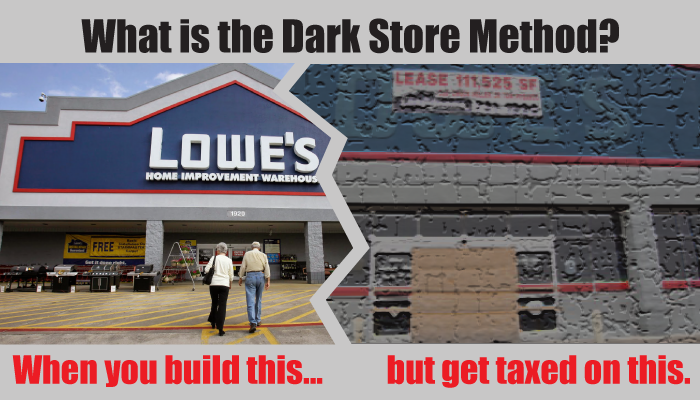[et_pb_section admin_label=”Section” fullwidth=”off” specialty=”on”][et_pb_column type=”3_4″ specialty_columns=”3″][et_pb_row_inner admin_label=”Row”][et_pb_column_inner type=”4_4″ saved_specialty_column_type=”3_4″][et_pb_text admin_label=”Text” background_layout=”light” text_orientation=”left” use_border_color=”off” border_style=”solid” disabled=”off” inline_fonts=”Montserrat”]
This Lawyer-Driven Profitability-Enhancement Scheme is Unique to Big Box Retailers
In 2008, Lowe’s, the giant retailer with annual sales around $50 Billion, built their Marquette store on U.S. 41 for $10 million. Michigan has three accepted methods of determining a property’s fair market value: comparable sales, the cost of construction less depreciation, and how much income a property produces.
The Lowe’s store was assessed at a taxable value of $5.2 million. Occasionally, property owners argue a valuation based on sales price of comparable properties is more fair. That’s what Lowe’s did?—?with a twist.
Lowe’s went to court and argued in front of the Michigan Tax Tribunal that big-box stores should be taxed based on comparable properties. Common big-box retail strategy is to erect stores that are cheaply built and essentially disposable (designed to be functionally obsolescent).They argue it would be exquisitely more fair to base brand new big-box taxable values on stores that were previously closed, abandoned by the retailer that built them, and have been sitting empty (dark), sometimes for years.
The Marquette Lowe’s is a successful store generating around $30 million in annual sales. But since the building has very little value (the company will someday simply abandon it and move on), the company feels that taxpayers should cut them a (huge) break on their property taxes.
But wait! There’s more!
Big-box stores typically come with deed restrictions attached, blocking other retailers from moving in to their old buildings for years. And not just direct competitors, but often any retailer that sells anything the chain sells. So, the properties they demand comparison to have been rendered nearly worthless by the retailer’s own actions. It’s like they want to be rewarded for saddling communities with abandoned monolithic structures rotting in the middle of sprawling parking lots, poorly built and banned from use for most other suitable purposes.
“Unlike many other commercial properties,” Lawrence Allen, the assessor hired by Lowe’s argued in court, “free standing ‘big-box’ stores like the subject [property] are not constructed for the purpose of thereafter selling or leasing the property in the marketplace.”
The tax tribunal agreed Lowe’s should be rewarded for their propagation of blight, and the original assessment of $5.2 million was reduced to $2.4 million for 2010, $2 million for 2011, and $1.5 million for 2012. That’s right, Lowe’s demanded the reduction be given retroactively.
This has to stop. We need to begin supporting the rise of local independent retailers instead of kneeling before giant chains, throwing money at them, and begging them to build their ‘disposable’ stores in our neighborhoods. These giant retailers have no stake in our communities, and don’t think twice about fleecing our libraries, schools and fire departments to fatten up their income statements.
Unsurprisingly, not wanting to miss out on a dime of additional profit, 12 other large retail chains in Marquette have appealed their property tax assessments. If they win?—?as they are expected to?—?WNMU Public Radio reports that Marquette’s tax-funded public services will have to refund big-box chains as much as $1.9 million in 2015.
I wonder how many days the library will have to close to pay their share of that homage to the mega-retailers. They’ve already discussed the possibility of having to close Mondays as well.
It’s important to note that other factors contributed to the Marquette library’s abbreviated hours, including dark store tax refunds/reductions granted to Home Depot, Menards, Kohl’s and Target, and a refund of back taxes paid to Duke LifePoint, the for-profit corporation that bought the former Marquette General Hospital two years ago.
So far, in the last three years, ‘dark store’ reductions have cost Michigan $47 million in lost property taxes. Those missing $47 million will likely be made up by individual taxpayers and small retailers.
The big-box retailers employ and retain armies of attorneys and tax specialists who devote their time to finding additional bottom-line dollars for their employers. Indications are that they’re just getting started. Unfortunately, small businesses can’t afford to hire legions of these specialists. Especially now that they’re being forced to subsidize their vastly-larger competitors’ tax bills. What a skillful way to build market share!
A Honigman partner who has tried or argued dozens of dark store cases on behalf of property owners told the Detroit Free press, “the horses are already out of the barn.” He estimates more than 90% of big box stores have already been re-assessed and says very few new stores are now being built.
[If I may offer my translation of his comment, I believe what he’s saying is, “haha…too late, suckers!” Then again, maybe I’m misinterpreting the comment. Please let me know what you think he’s trying to say.]
As for the library enthusiasts of Marquette, don’t worry, you can always go buy some nice home improvement books at Lowe’s, Home Depot or Menards. That is…if you can afford them, with the upcoming increases to your property taxes.
[/et_pb_text][/et_pb_column_inner][/et_pb_row_inner][/et_pb_column][et_pb_column type=”1_4″][et_pb_signup admin_label=”Email Optin” provider=”mailchimp” mailchimp_list=”d6fed2240a” title=”I want to subscribe to updates & news… Let me in on the action!” button_text=”Let’s Do It!” use_background_color=”on” background_color=”#575582″ background_layout=”dark” text_orientation=”left” use_focus_border_color=”off” use_border_color=”off” border_color=”#ffffff” border_width=”1px” border_style=”solid” custom_button=”off” button_text_size=”20″ button_use_icon=”on” button_icon_placement=”right” button_on_hover=”on” button_letter_spacing_hover=”0″ disabled=”off” saved_tabs=”all”] [/et_pb_signup][/et_pb_column][/et_pb_section]

